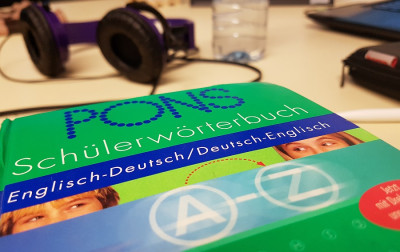Sprichst du Deutsch?

I came to Germany 5 months ago (September 2016) in order to do my European Voluntary Service (EVS). My German skills were very basic as English language was always more important then any other language in high school. But here I was in the middle of a country where every day started to be a struggle whether I should use der, die ordas.
"German is difficult because of it's grammar and many rules, many exceptions to the rules. There is no certain structure, you can know a lot of words but can't put them in a proper sentence." said Rita Rowland Jones, a friend whom I met during my German course in Volkshochschule Münster. Indeed, there is a general rule "the verb takes the second place in a sentence"... but still even if I have the needed vocabulary to create a sentence, the order of the sentence causes me a headache. Another amazing thing about German language are nouns as it is famous for its compound nouns. The fact we always need to write them with capital letter is actually a normal thing but I dare say nouns coming from Germany can be the longest words in the whole universe, e.g.:
Donaudampfschifffahrtselektrizitätenhauptbetriebswerkbauunterbeamtengesellschaft - 80 letters, yes that's just one word, and yes it has a meaning! Fascinating, oder? :)
The lenght of the words or their pronunciation make the language quite challenging for me to learn. Yet, there is one reason why I liebe German. I love learning langauges which have different letters from the alphabet of my mother tounge (Polish). All ß, ö, ü and ä make the word so cute even if it consists of 80 letters. I asked my German teacher, Mrs Sigrid Steinigeweg, if she's able to recognize the nationality of her students only after hearing their accent while speaking German: "I can distinguish the languages from Eastern Europe - Polish and Russian yes, Czech and Bulgarian less. I don't know all the African dialects, there are so many. Yet most of them speak either French, or English, or Portuguese and very often they take part of this accent. But I did a several mistakes concerning the accents when the people learnt another languages before, For instance I had people from Russia and they learn't English or French before and I didn't recognize the Russian accent".
Mrs Steinigeweg emphesized the importance of learning the language of the country you live in "Generally I would always recommend to learn the language of the country you live in. Even during holidays. I always spend my holidays on Fuerta Ventura, I started 20 years ago and I started learning Spanish, some Spanish at least. I try saying in Spanish what I want to say and the people react very friendly even if I make so many mistakes. They notice and approve the effort and that's what I expect of any person living in another country. I think is the culture of politeness". My Spanish friend from German classes, Laura Garcia, told me her reasons of learning German "I came to Germany because my husband has a job here so together with our childern we've been living here in Münster since 3 years. I guess to live here you need to know the language. Ok, you can communicate in English and even though German is very difficult I want to learn it because this is the way to integrate with the people and be accepted by the society. It's just illogical to come and live in a country and don't speak its language."
I never liked German, I want to be honest, mainly because of its pronunciation. After almost half a year of living here in Münster I really started to change my attitiude towards German language. And it's not only because it's already a daily routine to hear genau and stimmt while people talking. It's because Germany is giving me the best experience of my life and I already feel a kleines part of the country. And even if I might speak broken German, I have the need to try and integrate with German citizens. Not because I have to, but because I want to.
Beata Jaranowska



